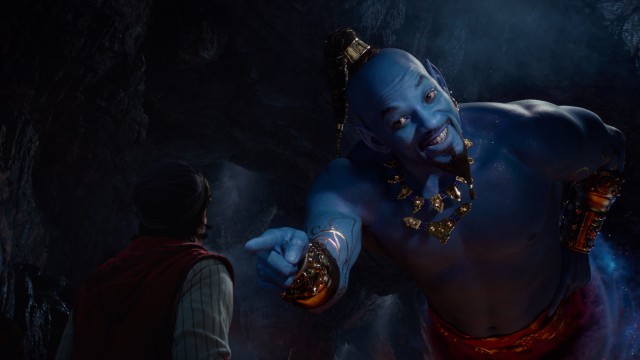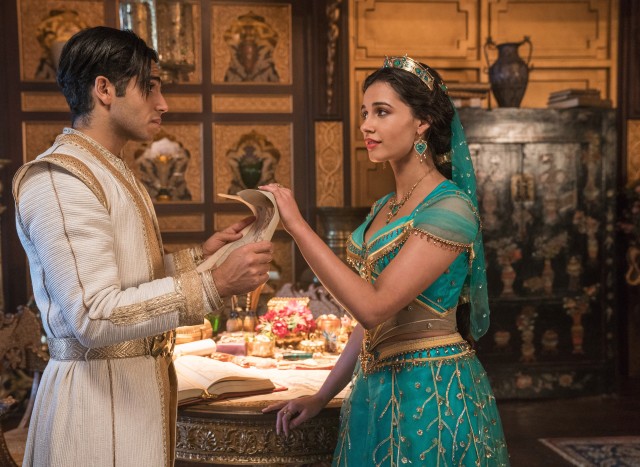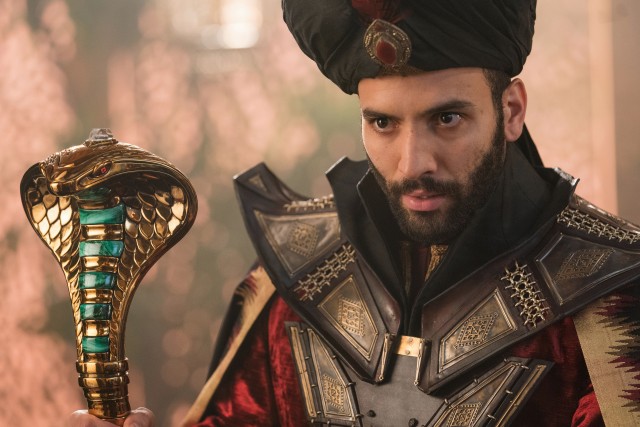Aladdin (2019) Movie Review
 |
Aladdin
Theatrical Release: May 25, 2019 / Running Time: 112 Minutes / Rating: PG Director: Guy Ritchie / Writers: John August (screenplay); John Musker, Ron Clements, Ted Elliott, Terry Rossio (1992 movie screenplay) Cast: Will Smith (Genie/Mariner), Mena Massoud (Aladdin/Prince Ali), Naomi Scott (Jasmine), Marwan Kenzari (Jafar), Navid Negahban (Sultan), Nasim Pedrad (Dalia), Billy Magnussen (Prince Anders), Jordan Nash (Omar), Taliyah Blair (Lian), Aubrey Lin (Omi), Amir Boutrous (Jamal), Numan Acar (Hakim), Alan Tudyk (voice of Iago), Frank Welker (voice of Cave of Wonders) Songs: "Arabian Nights (2019)", "One Jump Ahead", "Once Jump Ahead (Reprise 1)", "Speechless (Part 1)", "Friend Like Me", "Prince Ali", "A Whole New World", "One Jump Ahead (Reprise 2)", "Speechless (Part 2)", "Friend Like Me (End Title)", "A Whole New World (End Title)" |
The next stop on Disney's tour of lavishly remaking their most beloved animated classics in live action with copious amounts of CGI is Aladdin. This is a tricky one, not because the original 1992 film isn't popular. In fact, it remains one of the most enjoyed and revered works of the late 20th century animation renaissance, The other tricky thing about Aladdin is that the film is forever entwined with the legend of Robin Williams. His tour de force performance as the Genie arguably stands as the greatest voice-only contribution in the history of animation and perhaps cinema altogether. Maybe it didn't mean as much when he was lending his voice to movies like Robots and Happy Feet and churning out middling family comedies like RV and Old Dogs. But his death in 2014 rendered Williams immortal, as one of the only people who figured in practically every millennial's childhood and who would be remembered with great fondness. Who would dare try putting their own imprint on a bold, larger than life character that was quintissentially Williams?
The answer to that is Will Smith, one of the few actors with a track record in commercial film that rivals Williams' own and who has held onto A-list star status for just as long. It seems like Smith and possibly no one else was the solution to one of the biggest problems Disney faced in mounting an Aladdin remake. With the effects budget required to do justice to the animated film and the obligation for actual unknown actors of Middle Eastern origin to play almost all of the principal roles, the studio needed one huge, universally respected name to try to step into Williams' giant comic shoes and play the Genie. It's not quite the casting coup it would have been ten years ago when Smith's presence and a big-budget concept were enough to turn anything into one of the year's top grossers, but it's still significant and represents only the second time Smith and Disney have teamed up (the first being the hit 1998 Jerry Bruckheimer-produced Touchstone Pictures release Enemy of the State).
Disney's live-action remake boom has flourished without taking many unnecessary risks. Tim Burton's recent Dumbo reimagining was one of the few to play free with the source material and its reward for that was mixed reviews and the honor of being the first such undertaking This remake opens with Smith as a settled-down human seafarer whose two young children he treats to the story most viewers already know. His retelling of Aladdin's story begins with a new take on "Arabian Nights" as we make our way to Agrabah, a city near the Jordan River that houses marketplaces, the Sultan's palace, and a Cave of Wonders. The Sultan's Royal Vizier Jafar (Marwan Kenzari) holds great interest in the lattermost of those as he tries to find "the diamond in the rough" worthy of retrieving the magic lamp that resides deep within that treasure-filled cavern.
Ritchie's remake does expedite the meeting of our human leads. Aladdin (Mena Massoud), a gold-hearted thief whose only friend is a nonverbal monkey named Abu, helps the disguised Princess Jasmine (Naomi Scott) get out of an honorable act of theft she unknowingly performs for some hungry kids. As they escape from those in pursuit, Aladdin sings "One Jump Ahead", the anthem explaining his own lifestyle of necessary theft. The two get to know each other, as Aladdin mistakes the princess for a royal handmaiden, which Jasmine runs with, calling herself Dalia after her actual trusted servant (Nasim Pedrad).
Smitten, he sneaks past royal guards for another moment with Jasmine, who awkwardly poses as Dalia (while the real Dalia more awkwardly poses as the princess). This encounter paves the way for Aladdin to be the latest subject of Jafar's Cave of Wonders test. He retrieves the lamp, hands it over to Jafar, who reveals his nasty true colors. But Aladdin winds up with the lamp and rubbing it releases the blue Genie you've been waiting to see. Though "zany" has not been in Smith's arsenal to date, he embraces it as he must to perform "Friend Like Me", a song that simultaneously demonstrates his many powers while acclimating us to the now familiar rules: no more than three wishes, with resurrections and romance spells prohibited.
I'm assuming you both know and remember what goes down from here. As his first official wish (arrived at sneakily), Aladdin gets the Genie to turn him into Prince Ali, who can then become a viable suitor for the Princess' hand. Abu becomes an elephant on which Ali rides into Agrabah amidst much fanfare. At this point, Smith eases back into Hitch mode, becoming something of a love doctor to our hopeless lead, as he stumbles his way through an awkward "first" impression on the independent Jasmine. While this stretch moves Aladdin into romantic comedy territory, there are a number of adventure beats that still have to be hit as the film plays out pretty close to its predecessor.
The biggest change here is a sensible one befitting the times. Jasmine gets a new song "Speechless", which fleshes out her character and makes her a more active heroine. Whereas before she was simply tired of being holed up in the palace (hence the incognito marketplace excursion), here she actually longs to honor her late mother and herself become the next sultan. Of course, Jafar has his eyes on the position and he has a powerful scepter with which to entrance Jasmine's father (Navid Negahban) and have him carry out his will.
Aladdin feels like a bigger leap from its animated counterpart than Disney's other recent remakes have been. Maybe that's because the scope of the story is quite vast. Maybe because going from a hand-drawn animated animal to a more photorealistic computer-animated animal doesn't seem as significant as going from some fairly Western cartoon renderings to actual Middle Eastern actors in a convincingly exotic setting. Though primarily filmed on soundstages in England, the production did venture briefly into the Wadi Rum Desert in Jordan.
Hoping to avoid the laments of whitewashing that befell their Prince of Persia movie and other studios' works accused of appropriation, the film has strove for authentic casting. Massoud was born in Egypt, though he has lived in Canada since childhood. Scott hails from London and her Uganda-born mother is of Indian descent. Kenzari is Dutch, but his family is Tunisian. Negahban is based in America, but spent his first twenty years in Iran. Smith, Billy Magnussen (who sounds like a Sacha Baron Cohen caricature in a brief role as a European prince vying for Jasmine's hand), and two voice actors -- Alan Tudyk in the significantly reduced role of Jafar's scarlet macaw henchman Iago and the legendary Frank Welker reprising only one of his now-marginal three roles (the Cave of Wonders) -- are the only Americans in the cast. That approach should appease representation watchdogs, though it results in far less star power than we've gotten in 2017's Beauty and the Beast, 2016's The Jungle Book, 2015's Cinderella, and so on. I imagine that factors into the box office performance of the film, though how will be impossible to quantify.
For the most part, the cast is not extremely effective in their roles. Massoud leaves plenty to be desired dramatically, comedically, and vocally. Kenzari does not have great impact in what is regarded as one of Disney's great villains. Scott, on the other hand, does shine, which makes the expansion of Jasmine's character all the more welcome.
The characterization that will be subjected to the greatest scrutiny, though, will of course be Smith. It's a thankless role, as was made perfectly clear when reactions to the first trailer started trending on Twitter. We know Smith is as good as anyone at playing the charismatic and sarcastic everyman who steps up to save the world. The Genie is not that character, though. Smith puts a lot of effort into the role, for which he reportedly has landed "the biggest upfront money deal in film history" (topping Robert Downey Jr.'s Avengers pre-backend pay) by negotiating separate contracts for both acting and music, a field he has largely avoided this century. I just wish I could be more enthusiastic about the results. The best thing that can be said is that Smith doesn't trample upon Williams' work. Still, you can't help but cringe slightly when he recycles some of Williams' more iconic lines ("itty bitty living space") and has to perform some of the same vocal gymnastics Williams did on "Friend Like Me." And Smith's hip hop musical style isn't the smoothest fit with the tunes by Alan Menken, Howard Ashman, and Tim Rice.
For adapting what to every '90s kid seemed like the height of comedy, this new Aladdin is actually pretty stingy on laughs, especially when it's simply repeating tried and true bits. There are some chuckles to be had in the middle, particularly in Prince Ali's arrival at the palace, which involves an amusing tangent on jams. But if it is to be enjoyed at all, it is as an earnest romantic adventure that doesn't take itself too seriously.
There really is no way for Disney to emerge from these remakes pleasing everyone. Remain too faithful to the original and what's the point? Change things up so much and, again, what's the point? No budget information is available for Aladdin, though Smith's reported deal and the abundance of visual effects likely place it in the vicinity of the nearly $200 million tags stated for Maleficent and the "live-action" Jungle and Beauty. Despite that, there doesn't seem to be a great deal of pressure on this film to perform big. On the heels of the epic, still rising numbers of Avengers: Endgame, Disney already has guaranteed blockbusters scheduled for the next two months in Toy Story 4 and Jon Favreau's The Lion King, with Frozen 2 and the next Star Wars episode to follow at the holidays. The original Aladdin is so widely known and adored that it's hard to imagine there not being substantial interest in this. And even if the entertainment value pales in comparison to the animated version -- and there's no getting around that, it does -- the film should make enough money simply from people finding that out to be in the clear financially.
Disney has been on such a tear these past few years that the bigger concerns surround the titles that have come to them from acquiring Fox and what underperformance there would mean for the future of small and medium-sized movies. Hardly anyone seemed to notice or mind the company's recent announcement that they'd scale back Fox output to five or six movies a year, which almost certainly means five or six big tentpoles.
Guy Ritchie's Aladdin doesn't boast the broad appeal and joy of the original film, but there's so much great material within that this visually polished and carefully produced remake remains fairly watchable in spite of its faults.
|
Related Reviews:
DVDizzy.com | DVD and Blu-ray Reviews | New and Upcoming DVD & Blu-ray Schedule | Upcoming Cover Art | Search This Site
DVDizzy.com Top Stories:
Aladdin (1992)
Now in Theaters: Avengers: Endgame Pokιmon: Detective Pikachu UglyDolls Photograph
Directed by Guy Ritchie: Sherlock Holmes Sherlock Holmes: A Game of Shadows King Arthur: Legend of the Sword The Man from U.N.C.L.E.
Written by John August: Frankenweenie Dark Shadows
Will Smith: Hancock Men in Black Collateral Beauty | Naomi Scott: Lemonade Mouth The 33 | Marwan Kenzari: The Promise
Navid Negahban: American Sniper American Assassin 12 Strong
Beauty and the Beast (2017) The Jungle Book (2016) Cinderella (2015) Dumbo (2019) Mary Poppins Returns Christopher Robin
Text copyright 2019 DVDizzy.com. Images copyright 2019 Disney and Rideback Productions.
Unauthorized reproduction prohibited.


